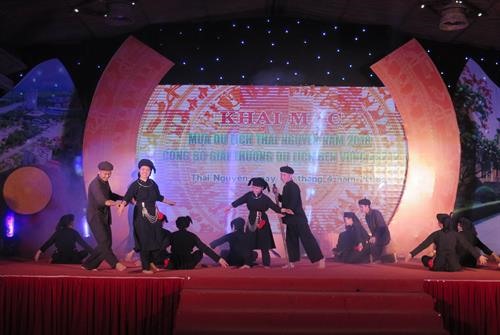 Life & Style
Life & Style

This year’s tourist season has began in the northern mountain province of Thái Nguyên with various events targeting sustainable development and ecological protection, says local tourism authority official.
 |
| Traditional art performances are a popular tourist attraction in the northern province of Thái Nguyên. — VNA/VNS Photo Quân Trang |
THÁI NGUYÊN — This year’s tourist season has kicked off in the northern mountain province of Thái Nguyên with various events targeting sustainable development and ecological protection, says local tourism authority official.
The goal this season is to promote investment in provincial tourism development in order to create favourable conditions for enterprises both inside and outside of the province to cooperate in organising more tours of the area, said Trịnh Việt Hùng, vice chairman of the province’s People’s Committee.
Hùng was speaking at an opening ceremony held on Wednesday in Thái Nguyên City’s nhà sàn (traditional stilt house) eco-tourism village.
The official urged local tourism agencies to intensify marketing programmes for their tourism services, with particular focus on utilising traditional cultural products, including unique specialties from the area, to attract domestic and international tourists.
At the same time, he said, they should focus on promoting the people’s awareness about the potential of local tourism and its role in the socio-economic development of the province.
The Việt Nam National Tourism Administration on Wednesday awarded the ASEAN sustainable tourism award to the province’s Thái Hải Nhà Sàn Eco-tourism Village.
The award aims to recognise cities, destinations, hotels and tourism businesses in the ASEAN member countries for their outstanding achievements in tourism development in 2017.
As part of the event on the same day, the Department of Culture, Sports and Tourism of Thái Nguyên Province held a scientific workshop with the theme “Thái Nguyên Province’s tourism development orientation up to 2025".
At the workshop, representatives from tourism and travel companies in seven northern provinces and cities discussed various issues including how to boost Thái Nguyên tourism to becoming a spearhead in the province’s economic sector. They also discussed how to encourage further investment in tourism development for the area, especially with regard to improving the quality of services.
Training of human resources staff for the tourism industry and learning from the experiences of existing tourist resorts and tourist villages was also discussed at the workshop. — VNS




